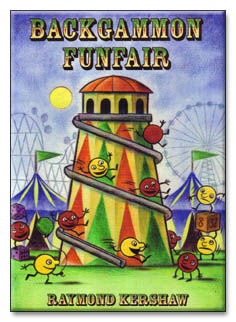|
| Backgammon Variants |

Backgammon Funfair
One of my favorite backgammon books is “Backgammon Funfair,” by Ray Kershaw. Ray’s book is a collection of novelties and diversions related to backgammon. It is a fun read for anyone who likes mathematical curiosities or logic puzzles, especially if you already like backgammon.

Some of the interesting questions explored in Backgammon Funfair:
- What is the shortest possible (cubeless) game of backgammon?
- Are there any backgammon positions with zero equity?
- What position and roll yield the most number of plays?
- What position and roll are most affected by the Jacoby rule?
- What is the largest joker in backgammon?
- When are 3 checkers better than 2 in a bearoff race?
- Doubling paradoxes: Jacoby paradox, Kauder paradox, etc.
It’s a nicely done book, and there was obviously a lot of work put into creating it. If you enjoy these types of puzzles, I definitely recommend getting the book.
Hypergammon
Some of the questions posed in Backgammon Funfair don’t have a conclusive answer. That’s because the game of backgammon hasn’t been solved yet. But there is a variant of backgammon, called “hypergammon,” which has been solved.
Hypergammon was devised in the 1980’s. It is played exactly as regular backgammon except that the players start with just 3 checkers each. The initial setup looks like this:
|
|
Hypergammon starting position |
Gammons and backgammons count just as in regular backgammon. The Jacoby rule applies. And the beaver rule is used.
You might think that with just six checkers on the board this game would be pretty simple to play. But it is not as simple you might imagine. Hypergammon is a fast-paced game with many tricky checker and cube decisions along the way.
Over the next few weeks, I plan to post a series of articles on some of the strange properties of hypergammon and some interesting puzzles. Here is the first one:
Returning to the Start
The first chapter of Backgammon Funfair asks: “What are the fewest moves needed to return to the backgammon starting position?”
It’s a fun puzzle. You might be able to figure it out for yourself. It turns out it is also a fun question to ask about hypergammon.
|
|
Hypergammon starting position |
Set up the board to the hypergammon starting position. Can you find a sequence of rolls that allow the two players, taking turns, to play in such a way that the game returns to the start? (Remember that the first roll cannot be doublets.)
Amazingly, it can be done in just 4 rolls. How do you do it? I’ll post the answer in a few days.

|
|

